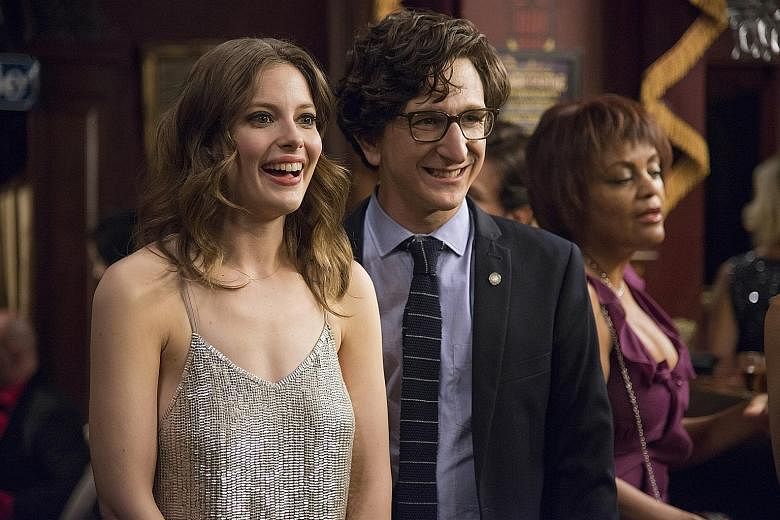Romantic-comedy specialist Judd Apatow says the original idea behind his new series Love was for a television show about a relationship that is a slow-motion trainwreck.
But when he sat down to make the series, he decided that the dysfunctional pairing of Gus (Paul Rust) and Mickey (Gillian Jacobs) - who are a mess both individually and together - was not necessarily doomed after all.
Released on streaming service Netflix last month, the widely binge-watched show has got critics talking because of its unlikable protagonists and atypical take on the relationship comedy.
Yet Apatow hints the couple may end up together - perhaps unsurprising, given that it is happily-ever-after in the romcoms he has written and directed for the big screen, including Knocked Up (2007), The 40-Year-Old Virgin (2005) and This is 40 (2012).
Speaking to the press in Los Angeles, the influential Hollywood producer - who co-created Love with lead actor Rust and Rust's wife Lesley Arfin - says this is also because the new show is a mash-up of his idea and the couple's.
"Paul and Lesley were talking about doing something about relationships and their observations about theirs and their friends'," says Apatow, 48.
"And I had in a notebook years ago an idea for a TV show called Trainwreck and it was for a show where you would follow a couple very slowly and see every single beat of their relationship and also know at the end they would break up.
"Not that this couple's going to break up," he says of Gus and Mickey, who cycle through ups and downs over the course of Season 1 and whose fate is uncertain ahead of the planned second season. "We don't know."
For Rust and Arfin, Love is semi-autobiographical: Rust, a 34-year-old writer and musician, plays a version of himself in the musically inclined Gus, who tutors child actors on TV sets, but aspires to become a screenwriter.
Jacobs' character Mickey is based on Arfin, a 36-year-old writer who has worked on the TV comedies Girls and Brooklyn Nine-Nine and who, like Mickey, has struggled with drug addiction.
The Rusts even resemble their on-screen stand-ins, with Rust as dorky-looking as Gus and Arfin, like Mickey, a thin and attractive brunette.
Probed about these similarities, the actor quips: "No, I've never been a nerd in a relationship before. Never happened. I'm always the cool guy."
Jacobs, the 33-year-old who plays his wife, sees herself in these characters too.
"I've never thrown a Blu-ray out of a moving car," she says, referring to a scene where Gus has a meltdown after confronting his ex-girlfriend.
"But I certainly feel like the show is relatable for me and for people I know. I've seen scenes like this go down. I've certainly had some public fights with people, especially when I lived in New York. I've cried on a stoop. So it felt sometimes eerily familiar," says the actress, who appeared on the TV comedy Community (2009 to 2015).
The Rusts happily admit to sharing some of Gus and Mickey's less admirable traits as well.
In an interview with New York Magazine, Arfin reveals that selfish Mickey is "a type of me that I like to think doesn't exist anymore".
Rust jokes that he and Gus share certain personality traits because they both hail from the Midwest region of the United States. "I think everybody in the Midwest is a good-hearted person with maybe a layer of unprocessed rage just underneath."
That Gus is from the largely rural state of South Dakota while Mickey is a city girl from New Jersey "feels like a way to sort of articulate" the differences between the characters and their chalk-and-cheese chemistry. As Rust says: "It's sort of a clash between two states, I guess."
Jacobs feels that her character's unlikability is one of the show's biggest assets.
"It's great to see a character who wears her vulnerabilities on her sleeve. She is someone who is struggling, trying to figure things out, wants to be better, wants love, wants to have figured it all out, but she clearly hasn't and she can't hide that she hasn't.
"There is something really refreshing about that. And as an actor, selfishly, those are my favourite types of characters to play."
Apatow agrees.
"I think people want to see characters struggle to find happiness and we all feel that way - that it's a bumpy road and we're trying to figure ourselves out," says the showrunner, who is married to This Is 40 actress Leslie Mann, 43, and has two daughters Maude, 18, and Iris, 13. The latter plays one of the child stars whom Gus tutors.
"So I think inherently you care about people who are trying to do better and then you want to be unique and show aspects of the experience viewers haven't seen a zillion times."
Even though he is still busy making movies such as Trainwreck (2015), the Amy Schumer film he recently produced, Apatow believes it is easier to develop such characters on TV.
"In movies, there are only so many endings - it is generally either happy or it's No Country For Old Men and he gets shot at the end. There're not that many ways to go.
"In a TV show, you're allowed to show all the nuances and end episodes in happy moments and sad moments and melancholy moments, and it's much more truthful because you don't have to tie it up with a bow."
• Love Season 1 is available on Netflix.

